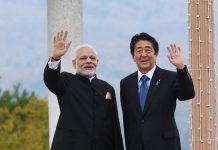
Following are the highlights of Finance Minister Arun Jaitley’s Budget 2018 presented before the Parliament on Thursday, will respond to questions on Twitter at 7 pm.
Highlights
- Rs 90,000 Crore Extra Collected as Income Tax Last Year
- Toll Booth Payments to Go Digital;
- Bengaluru Metro Gets Rs 17,000 Crore;
- Rs 11,000 Crore for Mumbai Rail Network
- President’s Salary Up to Rs 5 Lakh a Month, Veep to Get Rs 4.5 Lakh Per Month;
- Rs 150 Crore Fund to Celebrate Bapu’s 150th Anniversary
- Arun Jaitley pledges to Keep Fiscal Deficit at 3.3%, Says War on Blackmoney to Fund Welfare Schemes
- Demonetisation was received by honest taxpayers as ‘Imaandaari ka utsav’.
- Revised fiscal deficit estimate for 2017-18 is 3.5% of GDP, fiscal deficit of 3.3% expected for 2018-19.
- Automatic revision of MPs’ emoluments every five years, indexed to inflation.
- Recapitalisation to enable PSU banks to lend Rs 5 lakh crore.
- Exceeded the disinvestment target and collected Rs 1 lakh crore: FM.
- The government insurance companies to be merged into a single entity, and subsequently listed in the stock exchange, as part of the disinvestment programme.
- The government will assign every enterprise in India a unique ID on the lines of Aadhaar.
- The government has identified 372 basic business reform actions. Each state will take up these reforms.
- Explore the use of blockchain. Government to take all steps to eliminate use of cryptocurrencies which are being used to fund illegitimate transactions.
- Rs 5.97 lakh crore allocated for infrastructure spending in India.
- 5 lakh WiFi hotspots to be set up in rural areas to provide easy Internet access.
- Redevelopment of 600 major railway stations has been taken up; Mumbai transport system is being expanded; suburban network of 160 km planned for Bengaluru…
- The government proposes to revamp the system of sanctioning of loans to SMEs. The information required for sanctioning the loan will be linked with GSTN and all required information can be fetched from GSTN Portal. It will help to grant the loans quickly and will help in reducing processing time.
- Rs 3 lakh crore allocated for PM MUDRA Yojana.
- Mass formalization of MSME sector is happening after demonetization and GST.
- Total 187 projects sanctioned under the Namami Gange programme.
- 24 new government medical colleges and hospitals to be set up by upgrading existing district hospitals.
- Rs 600 crore has been announced for nutritional assistance to tuberculosis patients. 24 new government colleges have been announced which would offer free treatment to patients from the Schedule Tribes and Scheduled Tribes community.
- National health protection scheme for 10 crore poor and vulnerable families with approximately 50 crore beneficiaries by providing Rs 5 lakh per family per year for secondary and tertiary care hospitalisation. This will be the largest govt funded healthcare in the world. One medical college per every three constituency.
- RTE has been amended to enable more than 13 lakh untrained teachers to get trained. Eighteen new schools of planning and architecture will be set up. Technology will be the biggest driver in improving education. Deeksha portal to play a key role in this. By 2022 every block with more than 50% ST to have Eklavya
- Eighteen new schools of planning and architecure will be set up… I propose railway university in Vodadara.
- Eklavya schools to be started for Scheduled Tribe population… Propose to launch a scheme to revitalise school education with Rs 1 lakh crore in the next four years.
- Integrated B.Ed programme to be initiated for teachers, to improve quality of teachers.
- Technology will be the biggest driver in improving education.
- Rs 14.34 lakh crore to be spent for providing livelihood to rural India through infrastructure building.
- Loans to self help groups will increase to Rs 75,000 crore by March 2019.
- We aim that by 2022, all poor people have a house to live in.
- In the next financial year, we target the construction of two crore toilets.
- Removal of crop residue to be subsidised in order to tackle the problem of pollution due to burning of crop residue:
- Ujwala will give 8 crore women new LPG connections.
- Special scheme to address air pollution in Delhi-NCR region.
- Structural reforms will help economy achieve stronger growth
- Emphasis on generation of higher income for farmers
- Indian economy expected to become 5th largest very soon
- We are allocating natural resources in a more transparent manner
- We have worked sincerely without thinking about the political cost
- Finance Minister Arun Jaitley presents Budget 2018
- We hope to grow at 7.2% to 7.5% in second half
- Services being delivered to people at doorstep or in their accounts
- MSP to be increased to at least 1.5 times that of the production cost
- We have worked sincerely without thinking about the political cost
- Emphasis on generation of higher income for farmers
- Services being delivered to people at doorstep or in their accounts
- We are allocating natural resources in a more transparent manner
- We have placed the emphasis on higher income for farmers. Farm and non-farm employment for farmers’ remain the focus. Agriculture produce is on a record high. The government is working on farmers getting 50% more price than cost price. This will go forth to double farmer’s income by 2022. We don’t work in bits and pieces. We intend to promote MSP so that farmers get complete MSP. The govt will fix a structure in consultation with Niti Aayog and state governments to ensure farmers get MSP even when market prices are lower. MSP for Kharif cost will be 1.5 times the cost of produce
- Ujjawala yojana has provided crores of free LPG, Saubhagya Yojana has provided power to 4 crore families. Awas Yojana has worked towards providing interest rate relief to mid-level sections. We have worked sincerely without political costs. Direct Benefit Transfer is a global success story. We have controlled stent prices and there has been a production-centric thrust by the government. We have also provided free dialysis facilities for the poor
- When our government took over, our nation was considered a part of the fragile five. We have transformed the nation into the fastest growing economy in the world. We are a $2.5 Trillion economy. As a result of measures taken by the government, there is a premium on honesty. India achieved an average growth of 7.5% growth in the last 3 years. We are the third-largest economy in terms of purchasing power parity and seventh largest economy in the world in terms of growth. Manufacturing sector is back on track and services sector, which is India’s backbone, is performing well. This year’s budget will particularly concentrate on agriculture and rural economy. We will also focus on promoting education and healthcare
- Cluster-model approach to be adopted for agricultural production.
- The focus is on low-cost farming, higher MSP. Emphasis is on generating farm and non-farm employment for farmers.470 APMCs have been connected to eNAM network, the rest to be connected by March 2018… Agri-Market Development Fund with a corpus of 2000 crore to be set up for developing agricultural markets
- Agri-related stocks gain after it is said MSP for all crops to be increased by 1.5 times. Kaveri Seeds Co Ltd rose 2.4%, Jain Irrigation Systems Ltd 2.1%, Escorst Ltd rose 5%, Mahindra & Mahindra Ltd rose 2.2%.
11.09am: This year’s budget will focus on strengthening rural and agricultural economy.
11.08am: India grew at an average of 7.5% in the first three years since 2014. It is now a 2.5 trillion dollar economy.
11.07am: All the structural reforms will help the economy in the short and long-term… India is expected to become the fifth largest economy very soon.
11.06am: Our government has implemented structural reforms.
11.05am: India stands out as the fastest growing economy in the world… There is a premium on honesty.
11.04am: Finance minister Arun Jaitley begins his Budget speech.
NDA’s last full-year Budget: This is the last full-year Budget before the 2019 general elections and assembly polls that are due in eight states this year.
Farmers and poor likely in focus: The budget is expected to focus on farmers, the rural poor and small businesses.
To keep investors’ confidence, Prime Minister Narendra Modi’s government will need to be seen containing the fiscal deficit, while also increasing spending in key areas of a slowing economy.
Opposition sets strategy: UPA chairperson Sonia Gandhi is likely to chair a meeting of opposition leaders tomorrow to plan a joint strategy for the ongoing Budget Session of Parliament. According to sources, the meeting is slated to be held in the Parliament Library Building in the evening after the presentation of the Union Budget tomorrow morning by Finance Minister Arun Jaitley.
Tamil Nadu eyes ‘necessary’ funds: Tamil Nadu Deputy Chief Minister O Paneerselvam on Wednesday expressed confidence that the Union budget will allocate the required funds for Tamil Nadu.
Higher non-tax revenue eyed: Edelweiss Group chairman Rashesh Shah, who also heads the industry lobby Ficci as its president, has called for laying down a strategic road-map in the Budget to ensure higher non-tax revenue.
Markets cautious: The benchmark indices on Wednesday fell for the second consecutive day on Wednesday as traders cited weak global cues and position unwinding ahead of the Budget as the primary reasons behind the weakness. Apprehensions about a re-introduction of long-term capital gains tax weighed on sentiment.
Transparency sought: Claiming that the budgetary process in India was not transparent enough, an NGO on Wednesday urged the government to place more information related to the budget in the public domain. The Transparency International India has said on parameters of international standards on budget transparency, the Indian budget was considered “less transparent” as it put only “limited” information in the public domain. “Budgetary process in India is still non-transparent, non-participative with poor accessibility by citizenry,” it said in a press release in New Delhi.
West Bengal presents farmer-friendly budget: West Bengals budget for 2018-19, presented in the assembly on Wednesday, announced a number of relief measures targeting the agriculture sector.
Finance Minister Amit Mitra, in his budget speech, announced relief in payment of stamp duty fees for the rural sector, exemption of agriculture tax and cess on green tea leaves, mutation fees exemption for farmers, farmers pension, and creation of corpus for assisting them.
The panchayat polls in the state are due in the next three-four months, agencies reported.
The budget also announced various measures for women like increase of Kanyashri scholarship and introduction of marriage assistance under the Rupashree scheme with an initial outlay of Rs 1,500 crore.
The government also announced measures to help the physically challenged by increasing their pension amount from Rs 750 to Rs 1,000 per month that will benefit 2 lakh people.
The outlay for this scheme, named Manabik, has been pegged at Rs 250 crore.
Stamp duty payment in the rural areas for properties between Rs 40 lakh and Rs 1 crore had been reduced from 6 to 5 per cent.
For the urban sector too, the stamp duty has been reduced from 7 to 6 per cent.
The government also proposed to create an assistance corpus of Rs 100 crore for the farmers to be given out when in distress, and increase in farmers pension from Rs 750 to Rs 1,000 per month to cover 1 lakh beneficiaries.
The size of the budget for the year 2018-19 is Rs 2,14,958 crore, Mitra said, adding the state has been able to create employment for 8.92 lakh persons despite the adverse impact of the Goods and Services Tax (GST) and demonetisation.
The budget also proposed an additional resource mobilisation under tax revenue of Rs 1,870 crore during the year, agencies reported.
Expectations as per past reports:
The government may tweak income tax slabs and rates in today’s budget to bring down burden on individuals, according to a survey by tax and advisory firm Ernst & Young.
Arun Jaitley has already made it clear that the agriculture sector will be the top priority for the government in this year’s budget as the government attempts to address farmer distress ahead of the key state and national elections.
The budget will be watched closely for the fiscal deficit target for the next year. The Economic Survey, which was tabled on Monday, called for a pause in fiscal consolidation, leading to concerns that the government could widen its fiscal deficit targets for 2018-19.
Markets will be focused on how much the government widens its fiscal deficit beyond the 3 per cent of gross domestic product (GDP) projected for 2018-19. A Reuters poll showed most economists expect a 3.2 per cent deficit as the government looks to increase investments in areas like agriculture.
A modest widening of that nature would calm investors worried that the government may slip away from its judicious spending. But a deficit above 3.2 percent could hit shares and send bond yields up by 20-25 basis points, depending on the size of the blowout, on fears of populist policy ahead of next year’s elections.
A prudent budget could also soothe the Reserve Bank of India, which holds a policy review on February 6 and 7 amid worries it could raise rates in coming months after inflation hit a 17-month high in December, well above its 4 percent target.
While investors expect some spending to support an economy that’s expected to post its weakest growth in four years, they will want to see such stimulus is well-financed. Growth was impacted by the launch of the goods and service tax last year and a shock move to ban high value currency notes in late 2016, which hit tax revenues and increased the chances of a fiscal deficit shortfall.
An expected pickup in growth next fiscal year and state asset sales estimated to raise 1 trillion rupees ($15.74 billion) should boost tax revenues.
The government is also expected to stay on course with its focus on building highways and modernising the railways. Mr Jaitley had allocated a record Rs. 3.96 lakh crore to infrastructure sector in last year’s Budget.
Experts don’t see the possibility of a big cut in corporate tax rate for India Inc given the fiscal constraints. In his Budget speech of 2015-16, Mr Jaitley had said proposed reduction of the rate of corporate tax from 30 per cent to 25 per cent over the next four years.













